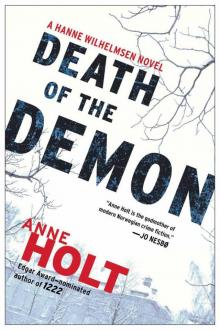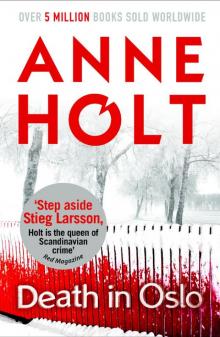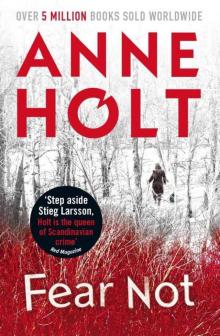Death of the Demon: A Hanne Wilhelmsen Novel Read online
Page 2
“I’m so fucking fat I can’t even stand up,” he said to himself in a low voice as he approached the living room.
“You, Olav!”
Maren was standing with her back turned, examining the dent on the refrigerator. He stopped without turning to face her.
“It was really good of you to help Kenneth with his bread. He’s so small and vulnerable.”
For a second the twelve-year-old new boy stood, hesitating, before turning around slowly.
“How old are you?”
“I’m twenty-six.”
“Oh, right.”
Olav went to bed hungry.
• • •
Raymond was snoring. Really snoring, like a grown man. The room was large, and in the faint light that entered through the darkened window Olav could discern a huge Rednex poster above his roommate’s bed. In one corner there was a dismantled off-road bike, and Raymond’s desktop was a chaotic jumble of textbooks, food wrappers, comics, and tools. His own desktop was completely bare.
The bedclothes were clean and starchy. They smelled strange but pleasant. Flowery, in some way. They were far nicer than the ones he had at home; they were adorned with Formula 1 racing cars and lots of bright colors. The pillowcase and quilt cover matched, and the bottom sheet was entirely blue, the same color as some of the cars. At home he never had any matching bedclothes.
The curtains stirred in the draft from the slightly open window. Raymond had decided that. He himself was used to a warm bedroom, and although he had new pajamas and a cozy quilt, he was shivering from the cold. He was hungry.
“Olav!”
It was the director. Or Agnes, as she liked to be called. She was whispering to him from the doorway.
“Are you sleeping?”
He turned over to face the wall and did not reply.
Go away, go away, said a voice inside his head, but it was no use. Now she was sitting on the edge of his bed.
“Don’t touch me.”
“I won’t touch you, Olav. I just want to have a little chat. I heard you were angry at supper tonight.”
Not a word.
“You have to understand that we can’t have any of the children behaving like that. Imagine if all eight of you were to bounce sugar and jam off the walls all the time!”
She chuckled softly.
“That would never do!”
He still remained silent.
“I’ve brought you some food. Three slices. Cheese and sausage. And a glass of milk. I’m putting it down here beside the bed. If you want to eat it, then that’s fine; if not we can agree that you’ll throw it in the trash early tomorrow morning without any of us seeing it. Then no one will know whether you wanted it. Okay?”
Moving slightly, the boy turned around abruptly.
“Are you the one who decided I have to stay here?” he asked loudly and indignantly.
“Shhh,” she hushed him. “You’ll wake Raymond! No, you know perfectly well that I don’t decide these things. My task is to take good care of you. With the other grown-ups. It’s going to be fine. Although you’re most definitely going to miss your mother. But you’ll be able to visit her often, you mustn’t forget that.”
Now he was sitting halfway up in the bed. He resembled a fat demon in the faint light—the outlandish raven-black hair, the wide mouth that even in the night darkness glowed bloodred. Involuntarily, she dropped her gaze. The hands on the quilt belonged to a young child. They were sizable, but the skin was like a baby’s, and they were helplessly clutching two cars on the quilt cover.
My God, she thought. This monster is only twelve years old. Twelve years!
“Actually,” he said, staring directly at her. “Actually you’re my prison guard. This is a fucking prison!”
At that moment the director of the Spring Sunshine Foster Home, the sole institution in Oslo for children and young people, saw something she had never, in the course of her twenty-three years of employment in child welfare services, seen before. Beneath the boy’s black, slender eyebrows she recognized an expression that so many despairing adults had, people whose children had been taken from them and who tarred her with the same brush as the rest of the official bureaucracy pursuing them. But Agnes Vestavik had never seen it in a child.
Hatred.
• • •
They sent me home from the clinic with renewed assurances. Everything was absolutely fine. He was just a bit voracious. And that was simply because he was a big, healthy boy. They sent me home after three days to an empty apartment. At the social services office I had been given money for a cot, a bouncing cradle, and some baby clothes. A lady had paid a visit two or three times, and I noticed her stealing glances into corners and then lying about looking for the toilet. Just to check whether my house was clean. As though that had ever been a problem. I scrub and scrub. There’s a constant reek of liquid detergent here.
He filled the apartment right away. I don’t quite know, but it seemed as though from the very first evening he considered that this was his own place, his apartment, his mum. His nights. He did not cry. He just made a noise. Others might have called it crying, but it wasn’t that. There were seldom any tears. The few times he really cried, it was actually easy to comfort him. Then he was hungry. I pushed my nipple into his mouth, and at that he shut up. Otherwise he just made a racket. A screaming, protesting noise while he waved his arms about, kicking off the quilt and wriggling out of his clothes. He filled the apartment to the bursting point so that I sometimes simply had to leave. I placed him in the bathroom, where the insulation is best, and tied him firmly to the bouncing cradle. For safety’s sake, I surrounded him with cushions on all sides. He was only a few months old, so it was impossible for him to free himself from the chair. Then I went out. To the center, where I had a cup of coffee, read a magazine, visited some stores. Occasionally I had a cigarette. I had managed to stop when I was pregnant and realized I shouldn’t smoke as long as I was breast-feeding. But one cigarette now and again couldn’t do any harm. All the same, I had a guilty conscience afterward.
My outings came to an abrupt halt when he was five months. I hadn’t been away long. Two hours, perhaps. Maximum. When I arrived back home, it was eerily silent. I wrenched open the bathroom door, and there he lay, lifeless, halfway out of the chair with the seat belt around his neck. It must have taken a number of seconds for me to gather myself and unfasten him. He coughed and rasped and was completely blue in the face. I cried my eyes out and shook him, and eventually his face returned to normal. Except that he was silent.
I cuddled him close to me and for the first time felt that I loved him. My child was five months old. And I hadn’t felt anything for him until then. Everything had been abnormal right from the start.
• • •
It was late. The new boy was worse than she had anticipated. She leafed through the psychologist’s report despite not being in the right frame of mind to digest much of it. She knew the vocabulary. It was the same for all the children, with only a few variations in terminology, different combinations. “Major deficiencies in care over a lengthy period of time”; “Mother unable to protect the boy from bullying”; “The boy is easily led”; “The boy is an underachiever at school”; “Extensive, grave problems in setting boundaries”; “The boy alternates between unrestrained, aggressive behavior and a parenthetical, overreaching, and almost chivalrous demeanor toward his mother and other adults, something clearly symptomatic of the hypothesis of serious developmental disorder as a result of neglect”; “The boy’s lack of impulse control may soon become an immediate danger to his environs, if he is not brought into an appropriate care setting, where he is provided with the consistency, security, and predictability he so greatly needs”; “The boy treats other children with an adult attitude that frightens them, is ostracized, and degenerates into aggressive, antisocial conduct.”
Only the very worst cases landed up here. In Norway, children who for one reason or another were unable to gr
ow up with their biological parents were expected to be placed in individual foster homes. That was the system. It was easy to find such homes for babies. Fairly straightforward as far as toddlers were concerned, up until about school-age. Then it suddenly became far more difficult. As a rule, however, they managed it. Except for the very worst cases. The ones that were so demanding, so damaged, so broken by their lives and their useless parents that no ordinary family could be expected to cope with the responsibility. These ended up with Agnes.
Smothering a yawn, she massaged the fleshy small of her back. Olav would probably get used to it. She had yet to give up on a child. Besides, strictly speaking, he was not the most difficult problem she had to deal with at the moment. Attempting in vain to find a more comfortable sitting position, she shoved Olav’s file down into a drawer and opened up another one, a folder with a cardboard cover containing five sheets of paper. She sat staring at it. In the end she packed them away too, taking a deep breath, and locking the drawer carefully. The key was somewhat sticky, but she managed finally to release it from the keyhole. Stiff and sore, she stood up, lifted a potted plant from the built-in bookcase beside the window, and returned the key to its place. For a few moments she stood there, looking out.
The garden always seemed more extensive at night. The moonlight cast frosty blue shadows across the remnants of snow. Down toward the road, beside a low wire-mesh fence, she spotted Glenn’s bicycle. With a sigh, she made up her mind to get tough with him this time. No bikes on icy, slippery roads. Two days previously, Christian had been instructed to lock it in the basement. Either he hadn’t done so, or else Glenn had broken into the storeroom and retrieved it. She did not quite know which was worse, a slapdash employee or a totally disobedient youngster.
There was a draft from the old, rickety window. They had to prioritize, and the upper floor, where the children spent most of their waking hours, had been fitted with new windows first. God only knew when her office would reach further up the list of priorities. She sighed softly and crossed over to the door. Although it was by no means tempting to go home, the way things stood between her and her husband, her body longed for sleep. If she were lucky, he would have already retired for the night.
Before she left, she looked in on Olav again. A quarter century’s experience with children told her at once that he was sleeping, although she could make out only the outline of his heavy shape in the bed. His breathing was quiet and even, and she took some time to tuck the quilt around him before closing the door quietly behind her. By then she had already smiled a little over the disappearance of the food and milk. Keeping to their bargain, she let the crockery remain.
In the dayroom, Christian was sitting with his feet up on the table, half asleep. Maren sat with her feet tucked beneath her in a winged armchair, reading a crime novel. As the director entered the room, Christian banged his feet down onto the floor in a reflex action. He should have been long gone, as his shift had finished an hour earlier. But he was too lazy.
“Honestly, it’s difficult enough teaching the youngsters to have manners without you lacking them entirely as well,” she said, directing herself to the young student who was employed part time on evening and night shifts. “What’s more, I thought we had agreed that Glenn’s bicycle was to be locked indoors!”
“Oh, bloody hell. I forgot it.”
He looked shamefaced as he fiddled with a huge pimple on the left side of his nose.
“Listen, Christian,” the director said, sitting down beside him, her back straight and knees clamped firmly together. “This is an institution run by the Salvation Army. We do what we can to clean up the children’s dreadful speech habits. Why is it so difficult for you to respect my demand to avoid all that swearing? Do you not understand that you really offend me every time you utter all those words? Children are children. You’re a grown man who ought to have learned to show consideration. Don’t you see that?”
“Sorry, sorry,” he mumbled submissively, and suddenly the pimple burst. Yellow pus ran out, and he stared in fascination at his finger.
“Heavens above,” Agnes groaned, getting to her feet and making a move to leave.
As she put on her coat, she turned toward Maren, who, oblivious of the minor altercation, had continued to turn the pages of her book.
“I need to have a meeting with you soon, just the two of us,” she said, and with a glance at Christian who was still looking incredulous at how much pus there was space for in a pimple, she added, “We must discuss the staffing roster for February and March. Can you draw up a proposal?”
“Mmm,” Maren agreed, glancing up from her novel for a second. “Okay.”
“It would be good if you could get it done tonight. Then we can discuss it tomorrow afternoon.”
Glancing up again, Maren smiled and nodded. “That’s fine, Agnes. It’ll be ready tomorrow afternoon. Perfectly okay. Good night!”
“Good night to you both.”
2
It was a beautiful villa. Although the funds for renovation had not extended to a more reverential restoration—they had simply replaced the original eight-paned windows by H Windows with crossbars attached—the house and its spires towered imposingly over nearly four acres of ground. The brick walls were painted beige, but with decorative timber in green, in the Swiss style. Two entire large floors had been divided five years previously, with two living rooms, a conference room, kitchen, bathroom, laundry room, and a room they named the library, though in fact it was a kind of records room, on the ground floor. On the upper floor there were six bedrooms for the children, but several of them were double rooms and a couple of the single rooms were now pressed into service as homework rooms and common rooms. In addition, there was a staff bedroom. At the end of the corridor, to the right of the staircase, lay the director’s office. Immediately across the hall was an enormous bathroom with a bathtub, as well as a smaller one with a shower and toilet. In addition to the good use of space on these two floors, there was an entire basement and a spacious, high-ceilinged attic. Following a fire inspection a few years earlier, ladders were installed at the windows at either end of the corridor, and there was a fire rope in every bedroom.
The youngsters loved fire drills. All except Kenneth. And now Olav. The former sat in the middle of the corridor, crying and clinging to the wall-mounted fire extinguisher. Olav stood with his legs apart, truculent, with his bottom lip more prominent than ever.
“No fuckin’ way,” he said petulantly. “No fuckin’ way am I going down that rope.”
“The ladder, then, Olav,” Maren offered. “The ladder’s not so scary. Also, you must get rid of that swearing very soon. You’ve been here for three weeks already, and your entire allowance is disappearing because of that!”
“Well then, go on, Olav.”
It was Terje who was prodding him in the back. Terje was in his thirties and, on paper at least, the assistant director.
“I’ll go right in front of you. Underneath you, in a way. So if you fall, I’ll be there to catch you. Okay?”
“Not fuckin’ likely,” Olav said, taking a step back.
“Ten kroner says the idiot doesn’t dare,” Glenn shouted from outside the window, having already climbed up and down four times.
“What will you do if the place starts to burn down?” Terje asked. “Are you going to burn to death?”
Olav stared at him maliciously.
“You couldn’t care less about that! Mum lives in a concrete apartment block. I could just move there, for instance.”
Shaking his head, Terje gave up and let Maren take over with the stubborn child.
“What is it you’re frightened of?” she asked quietly, indicating they should move into Olav’s room.
He reluctantly shuffled after her.
“I’m not frightened.”
He flopped onto the bed so it groaned audibly, and Maren found herself checking the solidity of the furniture before sitting down beside him.
�
��If you’re not scared, then what’s holding you back?”
“I just can’t be bothered. I’m not scared.”
From the corridor they could hear Kenneth sobbing bitterly through the excited yelling and Tarzan howls of the other youngsters as they swung on the ropes.
She was no saint. The dumbest things she knew were expressions such as “I’m so fond of children.” Children were like adults: some were enchanting, some were charming, others were scumbags. As a professional foster worker, she thought that no one could identify when she did not like a child. She did not treat individuals alike, as individuals were not alike, but she was fair and did not have favorites. There was a subtle balance there she was proud of, but Olav did something to her.
No one had managed to break through to him since he arrived. All the same, there was something about his expression as he sat there, like a dressed Buddha trying to appear angry but actually only being sad; there was something about his entire macabre figure that drew her to him. In defiance of the ban on making physical contact, she calmly stroked his hair, and he allowed her to do so.
“What is it with you, little Olav?” she said quietly, caressing him again.
“I’m not exactly little, you know,” he responded, but she sensed the hint of a smile in his voice.
“Just a bit,” she said, laughing. “Sometimes, anyway.”
“Do you like working here?” he asked suddenly, pushing her hand away from his head.
“Yes. I like it very, very much. I couldn’t imagine working anywhere else in the whole wide world.”
“How long have you been here?”
“About three years . . .”
Hesitating, she added, “Since I left college. School of Social Work. Almost four years. And I’m going to be here for many, many years to come.”

 A Grave for Two
A Grave for Two Dead Joker
Dead Joker Death of the Demon: A Hanne Wilhelmsen Novel
Death of the Demon: A Hanne Wilhelmsen Novel Punishment aka What Is Mine
Punishment aka What Is Mine Beyond the Truth
Beyond the Truth Death in Oslo
Death in Oslo The Blind Goddess
The Blind Goddess What Never Happens
What Never Happens 1222
1222 In Dust and Ashes
In Dust and Ashes Odd Numbers
Odd Numbers What is Mine
What is Mine What Dark Clouds Hide
What Dark Clouds Hide Blessed Are Those Who Thirst
Blessed Are Those Who Thirst Fear Not
Fear Not No Echo
No Echo Hanne Wilhelmsen - 01 - The Blind Goddess
Hanne Wilhelmsen - 01 - The Blind Goddess